An Analysis of Embedded Liberalism's Features and Significance
VerifiedAdded on 2020/02/05
|13
|3603
|70
Essay
AI Summary
This essay delves into the concept of embedded liberalism, as first articulated by John Ruggie, and its relevance to the contemporary global economy. It examines the core principles of embedded liberalism, which seeks to balance free trade with social protections, and its implications for the postwar economic boom, also known as the Golden Age of Capitalism. The essay discusses the significant features of the embedded liberal compromise, including its direct and indirect effects on economic growth, labor markets, and globalization. It also explores the significance of embedded liberalism in addressing economic insecurity, job displacement, and income inequality. The essay further analyzes the impact of embedded liberalism on various aspects of society, including religion, intercultural competence, and the use of information and communication technologies (ICTs) for development.
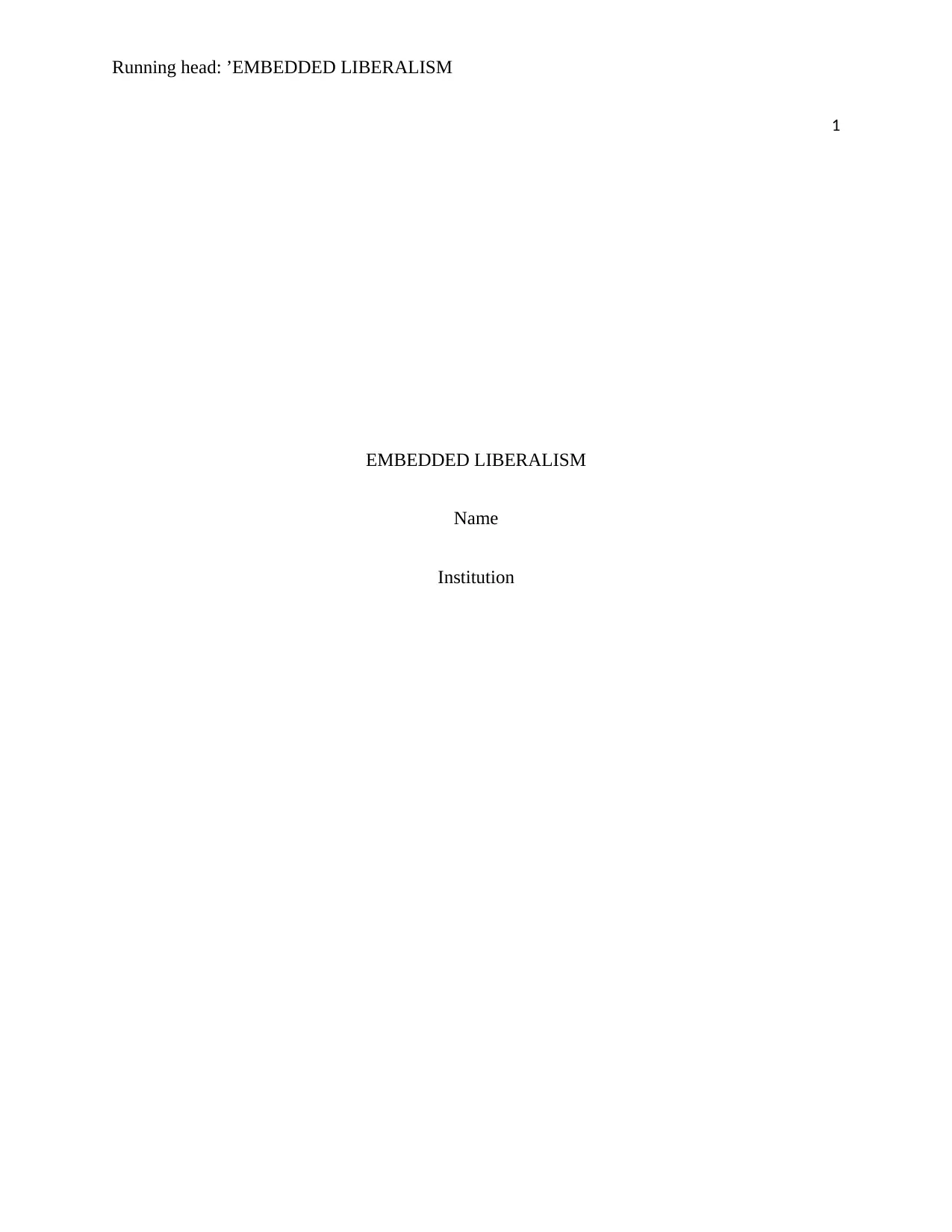
Running head: ’EMBEDDED LIBERALISM
1
EMBEDDED LIBERALISM
Name
Institution
1
EMBEDDED LIBERALISM
Name
Institution
Paraphrase This Document
Need a fresh take? Get an instant paraphrase of this document with our AI Paraphraser
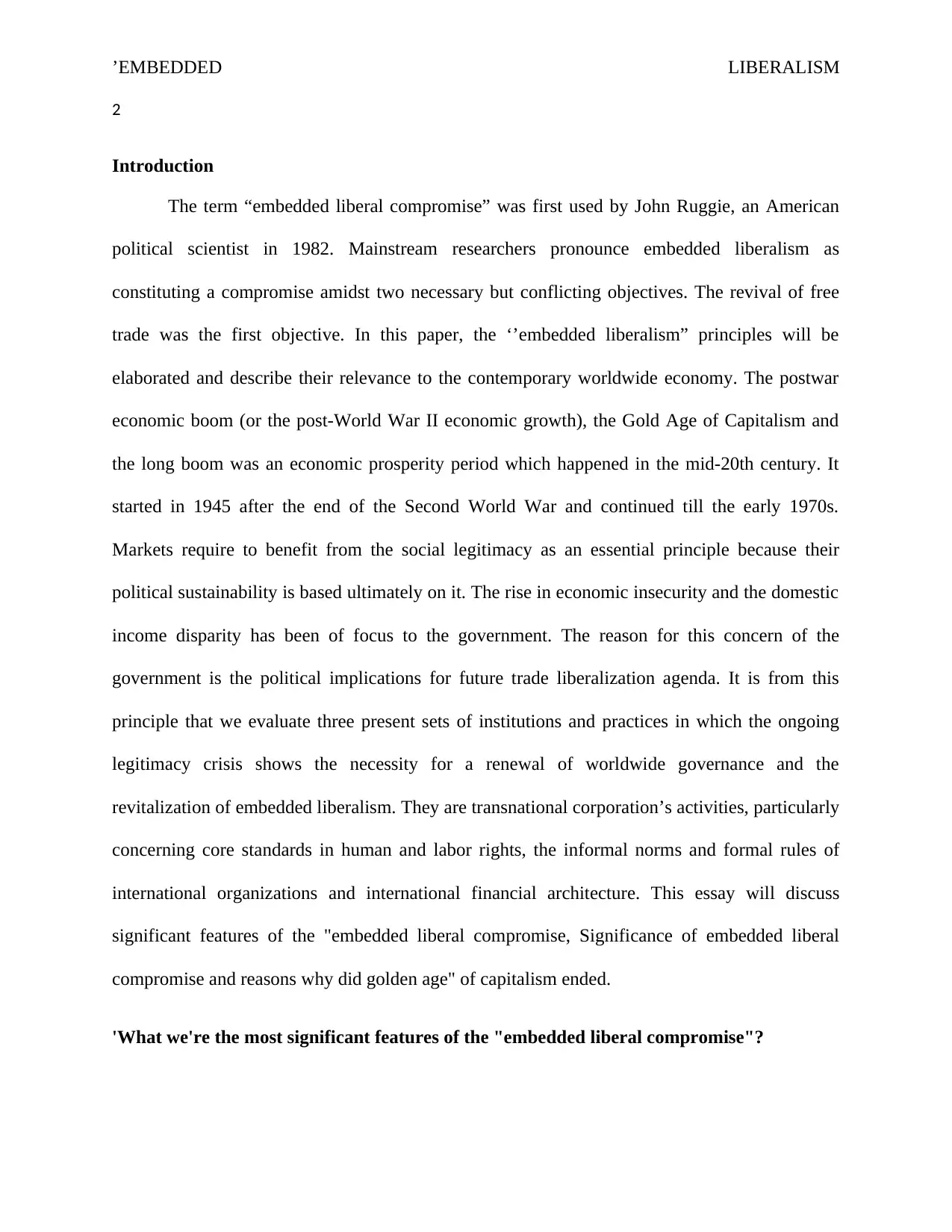
’EMBEDDED LIBERALISM
2
Introduction
The term “embedded liberal compromise” was first used by John Ruggie, an American
political scientist in 1982. Mainstream researchers pronounce embedded liberalism as
constituting a compromise amidst two necessary but conflicting objectives. The revival of free
trade was the first objective. In this paper, the ‘’embedded liberalism” principles will be
elaborated and describe their relevance to the contemporary worldwide economy. The postwar
economic boom (or the post-World War II economic growth), the Gold Age of Capitalism and
the long boom was an economic prosperity period which happened in the mid-20th century. It
started in 1945 after the end of the Second World War and continued till the early 1970s.
Markets require to benefit from the social legitimacy as an essential principle because their
political sustainability is based ultimately on it. The rise in economic insecurity and the domestic
income disparity has been of focus to the government. The reason for this concern of the
government is the political implications for future trade liberalization agenda. It is from this
principle that we evaluate three present sets of institutions and practices in which the ongoing
legitimacy crisis shows the necessity for a renewal of worldwide governance and the
revitalization of embedded liberalism. They are transnational corporation’s activities, particularly
concerning core standards in human and labor rights, the informal norms and formal rules of
international organizations and international financial architecture. This essay will discuss
significant features of the "embedded liberal compromise, Significance of embedded liberal
compromise and reasons why did golden age" of capitalism ended.
'What we're the most significant features of the "embedded liberal compromise"?
2
Introduction
The term “embedded liberal compromise” was first used by John Ruggie, an American
political scientist in 1982. Mainstream researchers pronounce embedded liberalism as
constituting a compromise amidst two necessary but conflicting objectives. The revival of free
trade was the first objective. In this paper, the ‘’embedded liberalism” principles will be
elaborated and describe their relevance to the contemporary worldwide economy. The postwar
economic boom (or the post-World War II economic growth), the Gold Age of Capitalism and
the long boom was an economic prosperity period which happened in the mid-20th century. It
started in 1945 after the end of the Second World War and continued till the early 1970s.
Markets require to benefit from the social legitimacy as an essential principle because their
political sustainability is based ultimately on it. The rise in economic insecurity and the domestic
income disparity has been of focus to the government. The reason for this concern of the
government is the political implications for future trade liberalization agenda. It is from this
principle that we evaluate three present sets of institutions and practices in which the ongoing
legitimacy crisis shows the necessity for a renewal of worldwide governance and the
revitalization of embedded liberalism. They are transnational corporation’s activities, particularly
concerning core standards in human and labor rights, the informal norms and formal rules of
international organizations and international financial architecture. This essay will discuss
significant features of the "embedded liberal compromise, Significance of embedded liberal
compromise and reasons why did golden age" of capitalism ended.
'What we're the most significant features of the "embedded liberal compromise"?
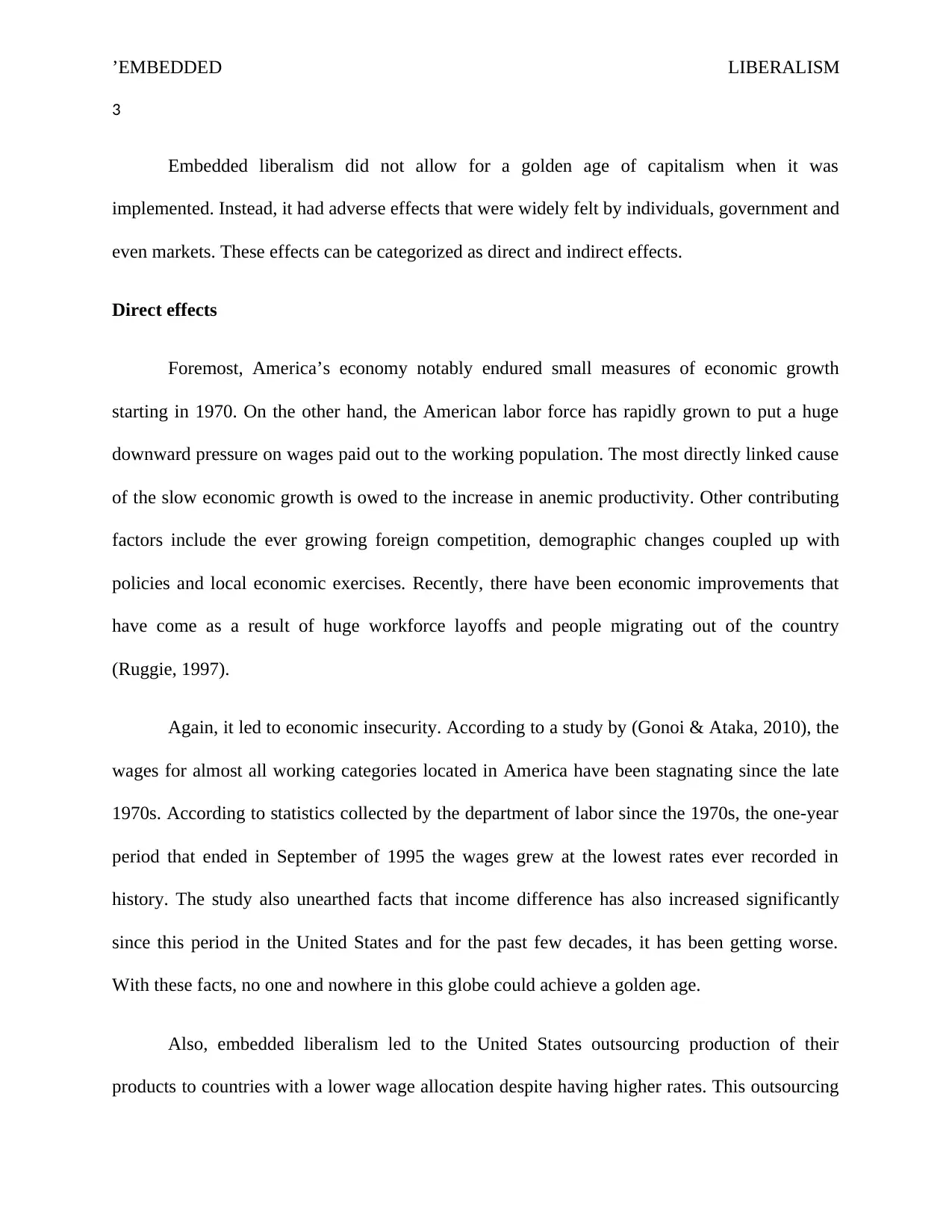
’EMBEDDED LIBERALISM
3
Embedded liberalism did not allow for a golden age of capitalism when it was
implemented. Instead, it had adverse effects that were widely felt by individuals, government and
even markets. These effects can be categorized as direct and indirect effects.
Direct effects
Foremost, America’s economy notably endured small measures of economic growth
starting in 1970. On the other hand, the American labor force has rapidly grown to put a huge
downward pressure on wages paid out to the working population. The most directly linked cause
of the slow economic growth is owed to the increase in anemic productivity. Other contributing
factors include the ever growing foreign competition, demographic changes coupled up with
policies and local economic exercises. Recently, there have been economic improvements that
have come as a result of huge workforce layoffs and people migrating out of the country
(Ruggie, 1997).
Again, it led to economic insecurity. According to a study by (Gonoi & Ataka, 2010), the
wages for almost all working categories located in America have been stagnating since the late
1970s. According to statistics collected by the department of labor since the 1970s, the one-year
period that ended in September of 1995 the wages grew at the lowest rates ever recorded in
history. The study also unearthed facts that income difference has also increased significantly
since this period in the United States and for the past few decades, it has been getting worse.
With these facts, no one and nowhere in this globe could achieve a golden age.
Also, embedded liberalism led to the United States outsourcing production of their
products to countries with a lower wage allocation despite having higher rates. This outsourcing
3
Embedded liberalism did not allow for a golden age of capitalism when it was
implemented. Instead, it had adverse effects that were widely felt by individuals, government and
even markets. These effects can be categorized as direct and indirect effects.
Direct effects
Foremost, America’s economy notably endured small measures of economic growth
starting in 1970. On the other hand, the American labor force has rapidly grown to put a huge
downward pressure on wages paid out to the working population. The most directly linked cause
of the slow economic growth is owed to the increase in anemic productivity. Other contributing
factors include the ever growing foreign competition, demographic changes coupled up with
policies and local economic exercises. Recently, there have been economic improvements that
have come as a result of huge workforce layoffs and people migrating out of the country
(Ruggie, 1997).
Again, it led to economic insecurity. According to a study by (Gonoi & Ataka, 2010), the
wages for almost all working categories located in America have been stagnating since the late
1970s. According to statistics collected by the department of labor since the 1970s, the one-year
period that ended in September of 1995 the wages grew at the lowest rates ever recorded in
history. The study also unearthed facts that income difference has also increased significantly
since this period in the United States and for the past few decades, it has been getting worse.
With these facts, no one and nowhere in this globe could achieve a golden age.
Also, embedded liberalism led to the United States outsourcing production of their
products to countries with a lower wage allocation despite having higher rates. This outsourcing
⊘ This is a preview!⊘
Do you want full access?
Subscribe today to unlock all pages.

Trusted by 1+ million students worldwide
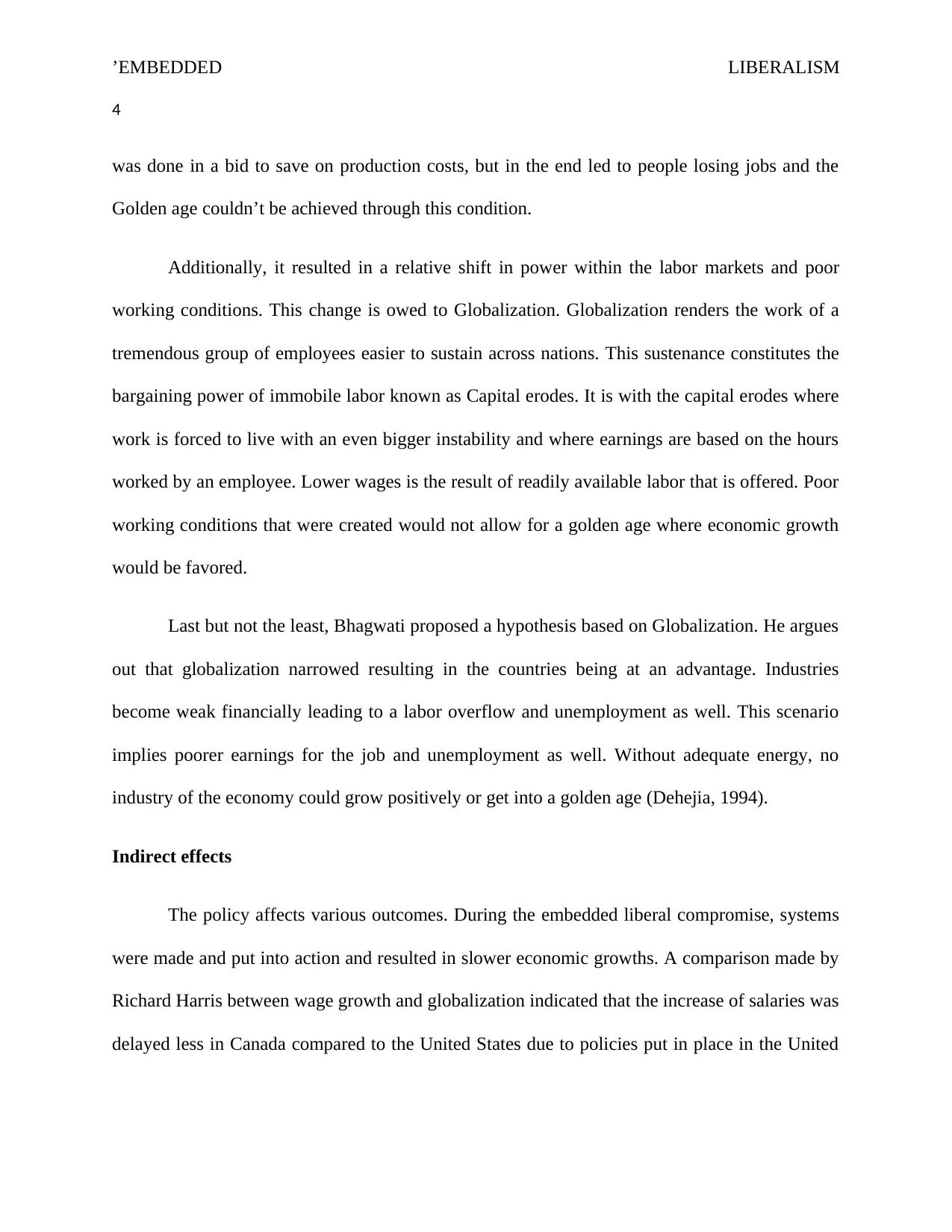
’EMBEDDED LIBERALISM
4
was done in a bid to save on production costs, but in the end led to people losing jobs and the
Golden age couldn’t be achieved through this condition.
Additionally, it resulted in a relative shift in power within the labor markets and poor
working conditions. This change is owed to Globalization. Globalization renders the work of a
tremendous group of employees easier to sustain across nations. This sustenance constitutes the
bargaining power of immobile labor known as Capital erodes. It is with the capital erodes where
work is forced to live with an even bigger instability and where earnings are based on the hours
worked by an employee. Lower wages is the result of readily available labor that is offered. Poor
working conditions that were created would not allow for a golden age where economic growth
would be favored.
Last but not the least, Bhagwati proposed a hypothesis based on Globalization. He argues
out that globalization narrowed resulting in the countries being at an advantage. Industries
become weak financially leading to a labor overflow and unemployment as well. This scenario
implies poorer earnings for the job and unemployment as well. Without adequate energy, no
industry of the economy could grow positively or get into a golden age (Dehejia, 1994).
Indirect effects
The policy affects various outcomes. During the embedded liberal compromise, systems
were made and put into action and resulted in slower economic growths. A comparison made by
Richard Harris between wage growth and globalization indicated that the increase of salaries was
delayed less in Canada compared to the United States due to policies put in place in the United
4
was done in a bid to save on production costs, but in the end led to people losing jobs and the
Golden age couldn’t be achieved through this condition.
Additionally, it resulted in a relative shift in power within the labor markets and poor
working conditions. This change is owed to Globalization. Globalization renders the work of a
tremendous group of employees easier to sustain across nations. This sustenance constitutes the
bargaining power of immobile labor known as Capital erodes. It is with the capital erodes where
work is forced to live with an even bigger instability and where earnings are based on the hours
worked by an employee. Lower wages is the result of readily available labor that is offered. Poor
working conditions that were created would not allow for a golden age where economic growth
would be favored.
Last but not the least, Bhagwati proposed a hypothesis based on Globalization. He argues
out that globalization narrowed resulting in the countries being at an advantage. Industries
become weak financially leading to a labor overflow and unemployment as well. This scenario
implies poorer earnings for the job and unemployment as well. Without adequate energy, no
industry of the economy could grow positively or get into a golden age (Dehejia, 1994).
Indirect effects
The policy affects various outcomes. During the embedded liberal compromise, systems
were made and put into action and resulted in slower economic growths. A comparison made by
Richard Harris between wage growth and globalization indicated that the increase of salaries was
delayed less in Canada compared to the United States due to policies put in place in the United
Paraphrase This Document
Need a fresh take? Get an instant paraphrase of this document with our AI Paraphraser
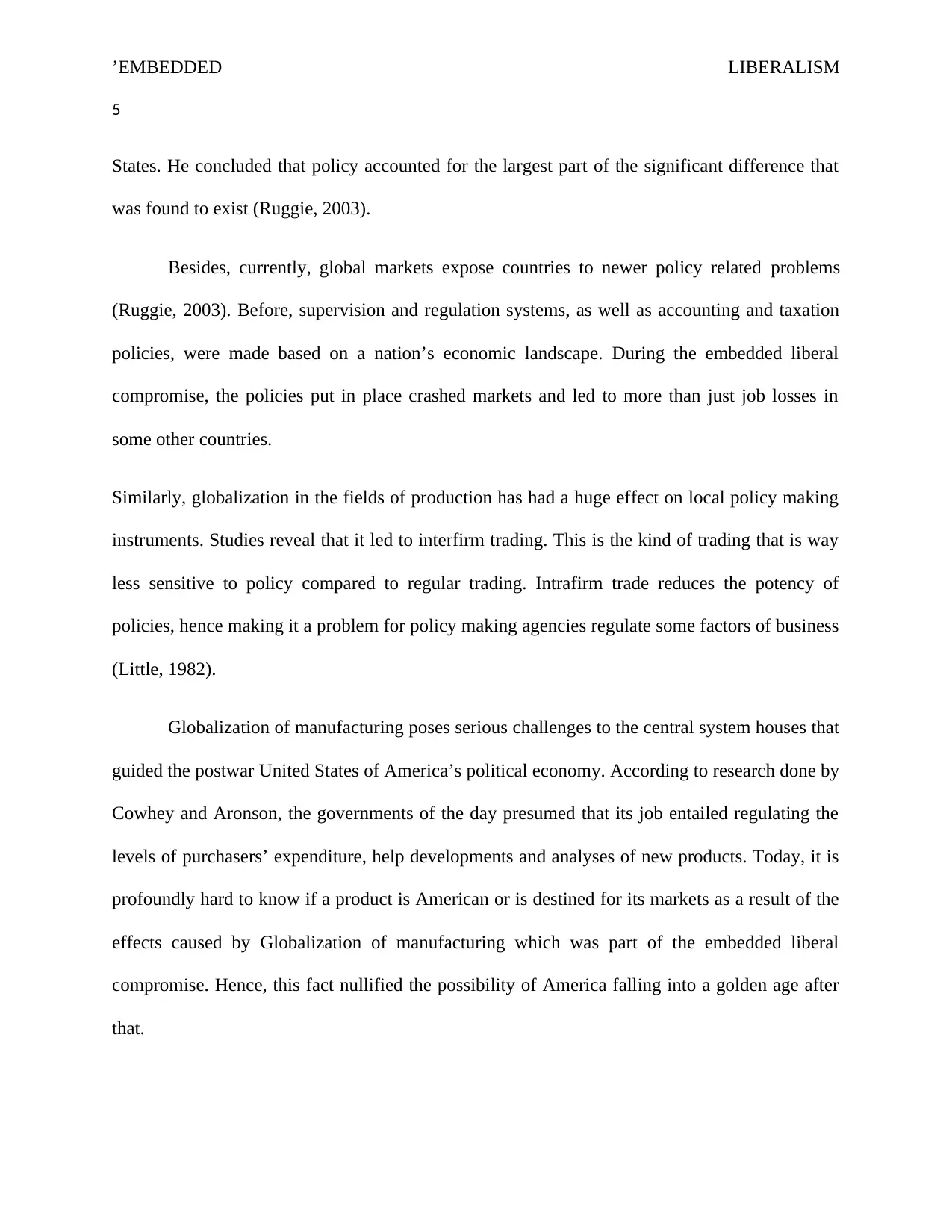
’EMBEDDED LIBERALISM
5
States. He concluded that policy accounted for the largest part of the significant difference that
was found to exist (Ruggie, 2003).
Besides, currently, global markets expose countries to newer policy related problems
(Ruggie, 2003). Before, supervision and regulation systems, as well as accounting and taxation
policies, were made based on a nation’s economic landscape. During the embedded liberal
compromise, the policies put in place crashed markets and led to more than just job losses in
some other countries.
Similarly, globalization in the fields of production has had a huge effect on local policy making
instruments. Studies reveal that it led to interfirm trading. This is the kind of trading that is way
less sensitive to policy compared to regular trading. Intrafirm trade reduces the potency of
policies, hence making it a problem for policy making agencies regulate some factors of business
(Little, 1982).
Globalization of manufacturing poses serious challenges to the central system houses that
guided the postwar United States of America’s political economy. According to research done by
Cowhey and Aronson, the governments of the day presumed that its job entailed regulating the
levels of purchasers’ expenditure, help developments and analyses of new products. Today, it is
profoundly hard to know if a product is American or is destined for its markets as a result of the
effects caused by Globalization of manufacturing which was part of the embedded liberal
compromise. Hence, this fact nullified the possibility of America falling into a golden age after
that.
5
States. He concluded that policy accounted for the largest part of the significant difference that
was found to exist (Ruggie, 2003).
Besides, currently, global markets expose countries to newer policy related problems
(Ruggie, 2003). Before, supervision and regulation systems, as well as accounting and taxation
policies, were made based on a nation’s economic landscape. During the embedded liberal
compromise, the policies put in place crashed markets and led to more than just job losses in
some other countries.
Similarly, globalization in the fields of production has had a huge effect on local policy making
instruments. Studies reveal that it led to interfirm trading. This is the kind of trading that is way
less sensitive to policy compared to regular trading. Intrafirm trade reduces the potency of
policies, hence making it a problem for policy making agencies regulate some factors of business
(Little, 1982).
Globalization of manufacturing poses serious challenges to the central system houses that
guided the postwar United States of America’s political economy. According to research done by
Cowhey and Aronson, the governments of the day presumed that its job entailed regulating the
levels of purchasers’ expenditure, help developments and analyses of new products. Today, it is
profoundly hard to know if a product is American or is destined for its markets as a result of the
effects caused by Globalization of manufacturing which was part of the embedded liberal
compromise. Hence, this fact nullified the possibility of America falling into a golden age after
that.
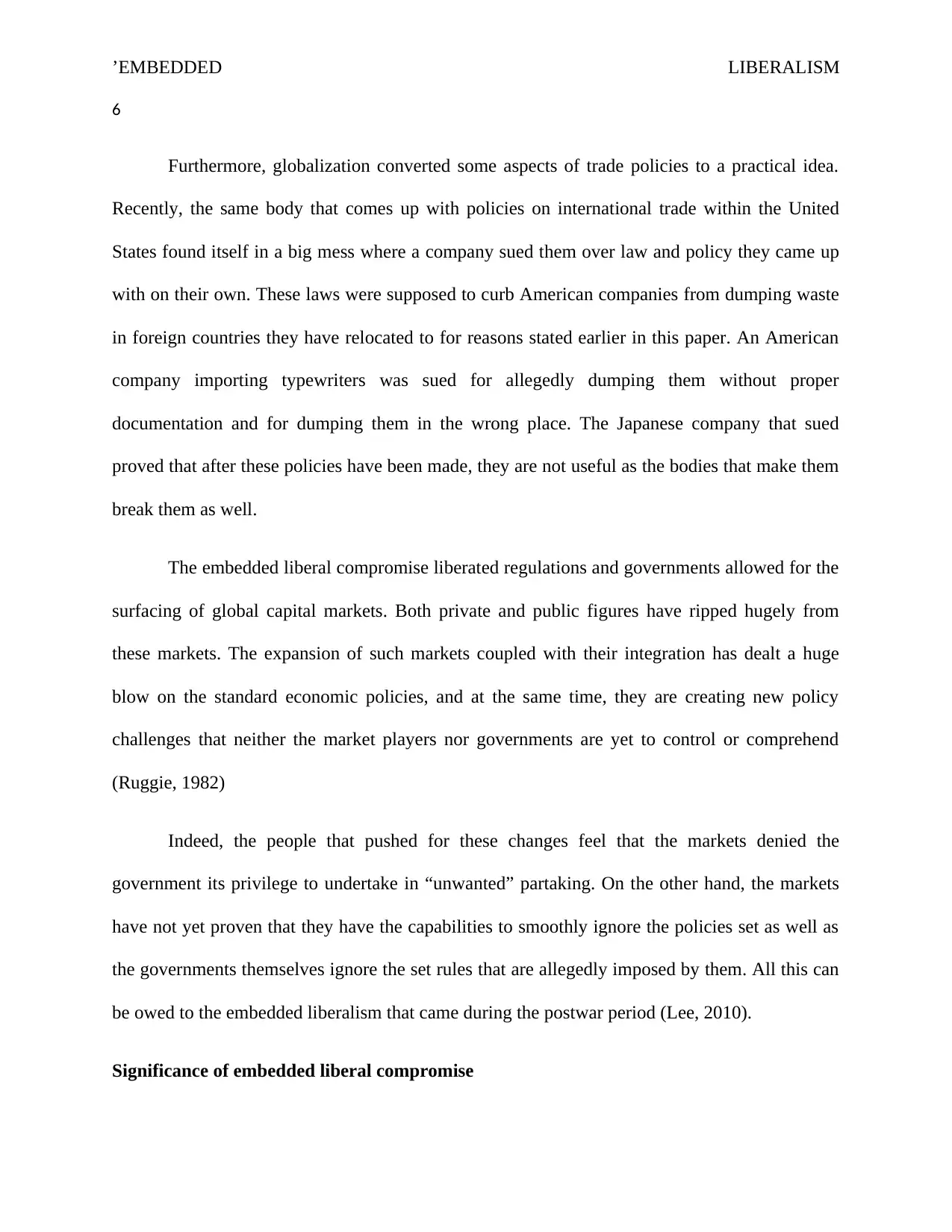
’EMBEDDED LIBERALISM
6
Furthermore, globalization converted some aspects of trade policies to a practical idea.
Recently, the same body that comes up with policies on international trade within the United
States found itself in a big mess where a company sued them over law and policy they came up
with on their own. These laws were supposed to curb American companies from dumping waste
in foreign countries they have relocated to for reasons stated earlier in this paper. An American
company importing typewriters was sued for allegedly dumping them without proper
documentation and for dumping them in the wrong place. The Japanese company that sued
proved that after these policies have been made, they are not useful as the bodies that make them
break them as well.
The embedded liberal compromise liberated regulations and governments allowed for the
surfacing of global capital markets. Both private and public figures have ripped hugely from
these markets. The expansion of such markets coupled with their integration has dealt a huge
blow on the standard economic policies, and at the same time, they are creating new policy
challenges that neither the market players nor governments are yet to control or comprehend
(Ruggie, 1982)
Indeed, the people that pushed for these changes feel that the markets denied the
government its privilege to undertake in “unwanted” partaking. On the other hand, the markets
have not yet proven that they have the capabilities to smoothly ignore the policies set as well as
the governments themselves ignore the set rules that are allegedly imposed by them. All this can
be owed to the embedded liberalism that came during the postwar period (Lee, 2010).
Significance of embedded liberal compromise
6
Furthermore, globalization converted some aspects of trade policies to a practical idea.
Recently, the same body that comes up with policies on international trade within the United
States found itself in a big mess where a company sued them over law and policy they came up
with on their own. These laws were supposed to curb American companies from dumping waste
in foreign countries they have relocated to for reasons stated earlier in this paper. An American
company importing typewriters was sued for allegedly dumping them without proper
documentation and for dumping them in the wrong place. The Japanese company that sued
proved that after these policies have been made, they are not useful as the bodies that make them
break them as well.
The embedded liberal compromise liberated regulations and governments allowed for the
surfacing of global capital markets. Both private and public figures have ripped hugely from
these markets. The expansion of such markets coupled with their integration has dealt a huge
blow on the standard economic policies, and at the same time, they are creating new policy
challenges that neither the market players nor governments are yet to control or comprehend
(Ruggie, 1982)
Indeed, the people that pushed for these changes feel that the markets denied the
government its privilege to undertake in “unwanted” partaking. On the other hand, the markets
have not yet proven that they have the capabilities to smoothly ignore the policies set as well as
the governments themselves ignore the set rules that are allegedly imposed by them. All this can
be owed to the embedded liberalism that came during the postwar period (Lee, 2010).
Significance of embedded liberal compromise
⊘ This is a preview!⊘
Do you want full access?
Subscribe today to unlock all pages.

Trusted by 1+ million students worldwide
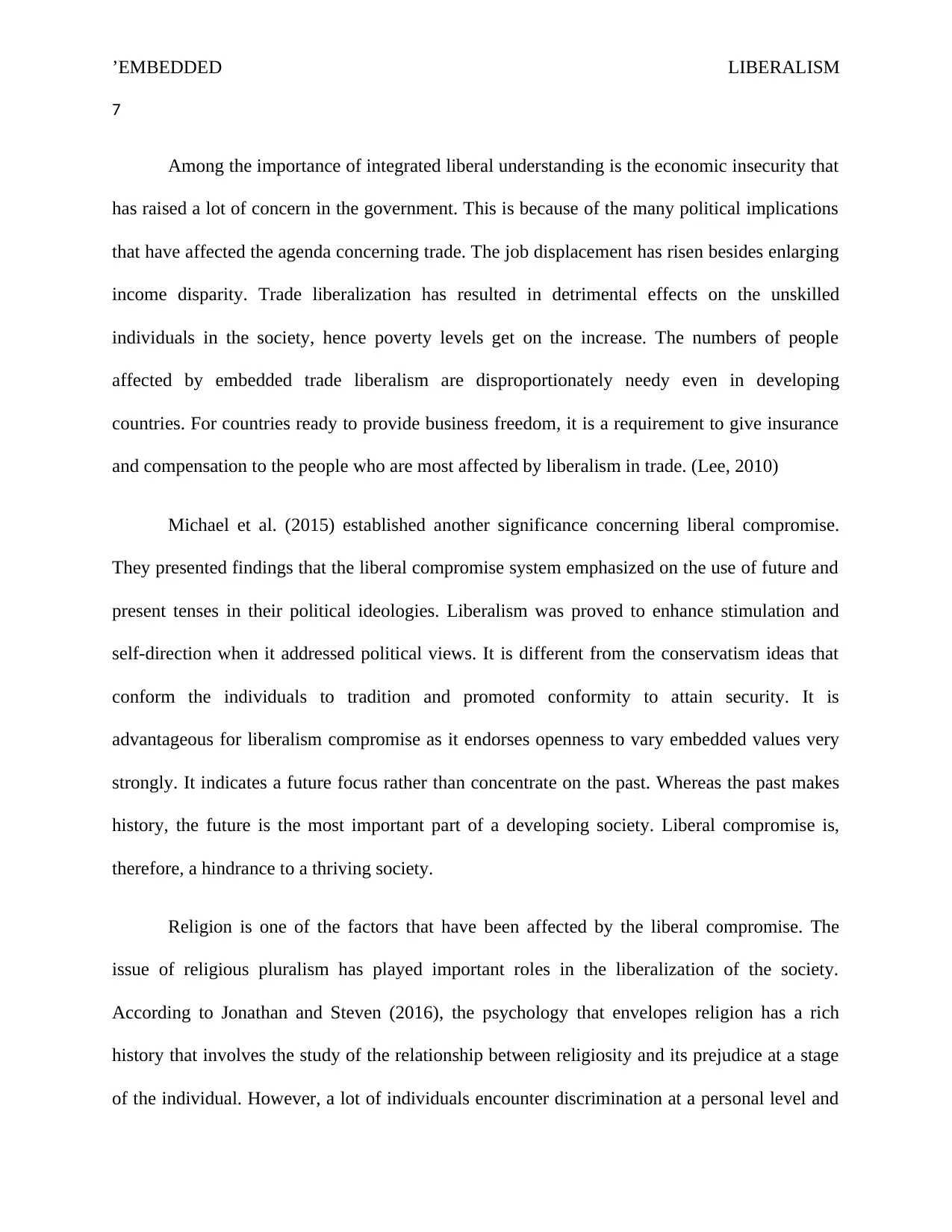
’EMBEDDED LIBERALISM
7
Among the importance of integrated liberal understanding is the economic insecurity that
has raised a lot of concern in the government. This is because of the many political implications
that have affected the agenda concerning trade. The job displacement has risen besides enlarging
income disparity. Trade liberalization has resulted in detrimental effects on the unskilled
individuals in the society, hence poverty levels get on the increase. The numbers of people
affected by embedded trade liberalism are disproportionately needy even in developing
countries. For countries ready to provide business freedom, it is a requirement to give insurance
and compensation to the people who are most affected by liberalism in trade. (Lee, 2010)
Michael et al. (2015) established another significance concerning liberal compromise.
They presented findings that the liberal compromise system emphasized on the use of future and
present tenses in their political ideologies. Liberalism was proved to enhance stimulation and
self-direction when it addressed political views. It is different from the conservatism ideas that
conform the individuals to tradition and promoted conformity to attain security. It is
advantageous for liberalism compromise as it endorses openness to vary embedded values very
strongly. It indicates a future focus rather than concentrate on the past. Whereas the past makes
history, the future is the most important part of a developing society. Liberal compromise is,
therefore, a hindrance to a thriving society.
Religion is one of the factors that have been affected by the liberal compromise. The
issue of religious pluralism has played important roles in the liberalization of the society.
According to Jonathan and Steven (2016), the psychology that envelopes religion has a rich
history that involves the study of the relationship between religiosity and its prejudice at a stage
of the individual. However, a lot of individuals encounter discrimination at a personal level and
7
Among the importance of integrated liberal understanding is the economic insecurity that
has raised a lot of concern in the government. This is because of the many political implications
that have affected the agenda concerning trade. The job displacement has risen besides enlarging
income disparity. Trade liberalization has resulted in detrimental effects on the unskilled
individuals in the society, hence poverty levels get on the increase. The numbers of people
affected by embedded trade liberalism are disproportionately needy even in developing
countries. For countries ready to provide business freedom, it is a requirement to give insurance
and compensation to the people who are most affected by liberalism in trade. (Lee, 2010)
Michael et al. (2015) established another significance concerning liberal compromise.
They presented findings that the liberal compromise system emphasized on the use of future and
present tenses in their political ideologies. Liberalism was proved to enhance stimulation and
self-direction when it addressed political views. It is different from the conservatism ideas that
conform the individuals to tradition and promoted conformity to attain security. It is
advantageous for liberalism compromise as it endorses openness to vary embedded values very
strongly. It indicates a future focus rather than concentrate on the past. Whereas the past makes
history, the future is the most important part of a developing society. Liberal compromise is,
therefore, a hindrance to a thriving society.
Religion is one of the factors that have been affected by the liberal compromise. The
issue of religious pluralism has played important roles in the liberalization of the society.
According to Jonathan and Steven (2016), the psychology that envelopes religion has a rich
history that involves the study of the relationship between religiosity and its prejudice at a stage
of the individual. However, a lot of individuals encounter discrimination at a personal level and
Paraphrase This Document
Need a fresh take? Get an instant paraphrase of this document with our AI Paraphraser
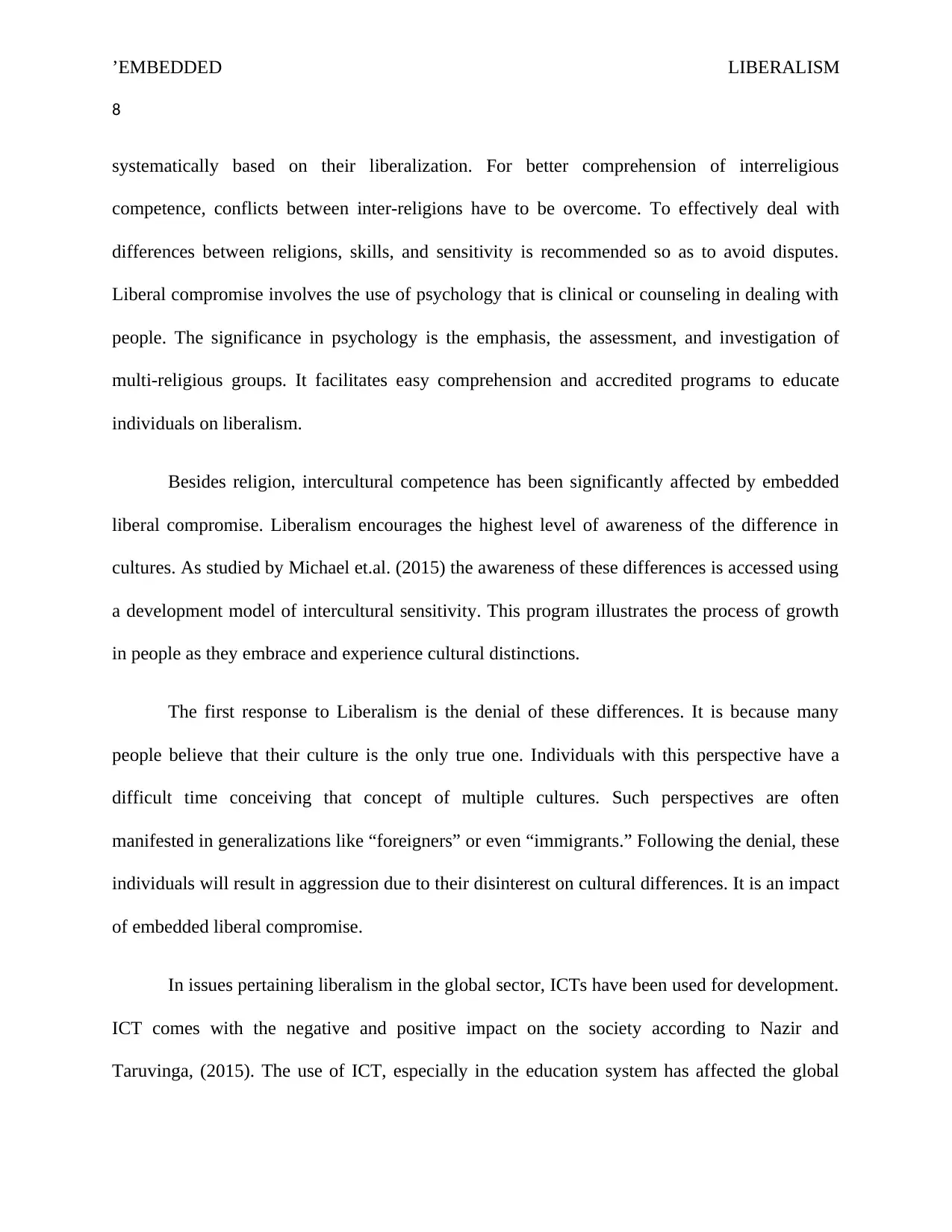
’EMBEDDED LIBERALISM
8
systematically based on their liberalization. For better comprehension of interreligious
competence, conflicts between inter-religions have to be overcome. To effectively deal with
differences between religions, skills, and sensitivity is recommended so as to avoid disputes.
Liberal compromise involves the use of psychology that is clinical or counseling in dealing with
people. The significance in psychology is the emphasis, the assessment, and investigation of
multi-religious groups. It facilitates easy comprehension and accredited programs to educate
individuals on liberalism.
Besides religion, intercultural competence has been significantly affected by embedded
liberal compromise. Liberalism encourages the highest level of awareness of the difference in
cultures. As studied by Michael et.al. (2015) the awareness of these differences is accessed using
a development model of intercultural sensitivity. This program illustrates the process of growth
in people as they embrace and experience cultural distinctions.
The first response to Liberalism is the denial of these differences. It is because many
people believe that their culture is the only true one. Individuals with this perspective have a
difficult time conceiving that concept of multiple cultures. Such perspectives are often
manifested in generalizations like “foreigners” or even “immigrants.” Following the denial, these
individuals will result in aggression due to their disinterest on cultural differences. It is an impact
of embedded liberal compromise.
In issues pertaining liberalism in the global sector, ICTs have been used for development.
ICT comes with the negative and positive impact on the society according to Nazir and
Taruvinga, (2015). The use of ICT, especially in the education system has affected the global
8
systematically based on their liberalization. For better comprehension of interreligious
competence, conflicts between inter-religions have to be overcome. To effectively deal with
differences between religions, skills, and sensitivity is recommended so as to avoid disputes.
Liberal compromise involves the use of psychology that is clinical or counseling in dealing with
people. The significance in psychology is the emphasis, the assessment, and investigation of
multi-religious groups. It facilitates easy comprehension and accredited programs to educate
individuals on liberalism.
Besides religion, intercultural competence has been significantly affected by embedded
liberal compromise. Liberalism encourages the highest level of awareness of the difference in
cultures. As studied by Michael et.al. (2015) the awareness of these differences is accessed using
a development model of intercultural sensitivity. This program illustrates the process of growth
in people as they embrace and experience cultural distinctions.
The first response to Liberalism is the denial of these differences. It is because many
people believe that their culture is the only true one. Individuals with this perspective have a
difficult time conceiving that concept of multiple cultures. Such perspectives are often
manifested in generalizations like “foreigners” or even “immigrants.” Following the denial, these
individuals will result in aggression due to their disinterest on cultural differences. It is an impact
of embedded liberal compromise.
In issues pertaining liberalism in the global sector, ICTs have been used for development.
ICT comes with the negative and positive impact on the society according to Nazir and
Taruvinga, (2015). The use of ICT, especially in the education system has affected the global
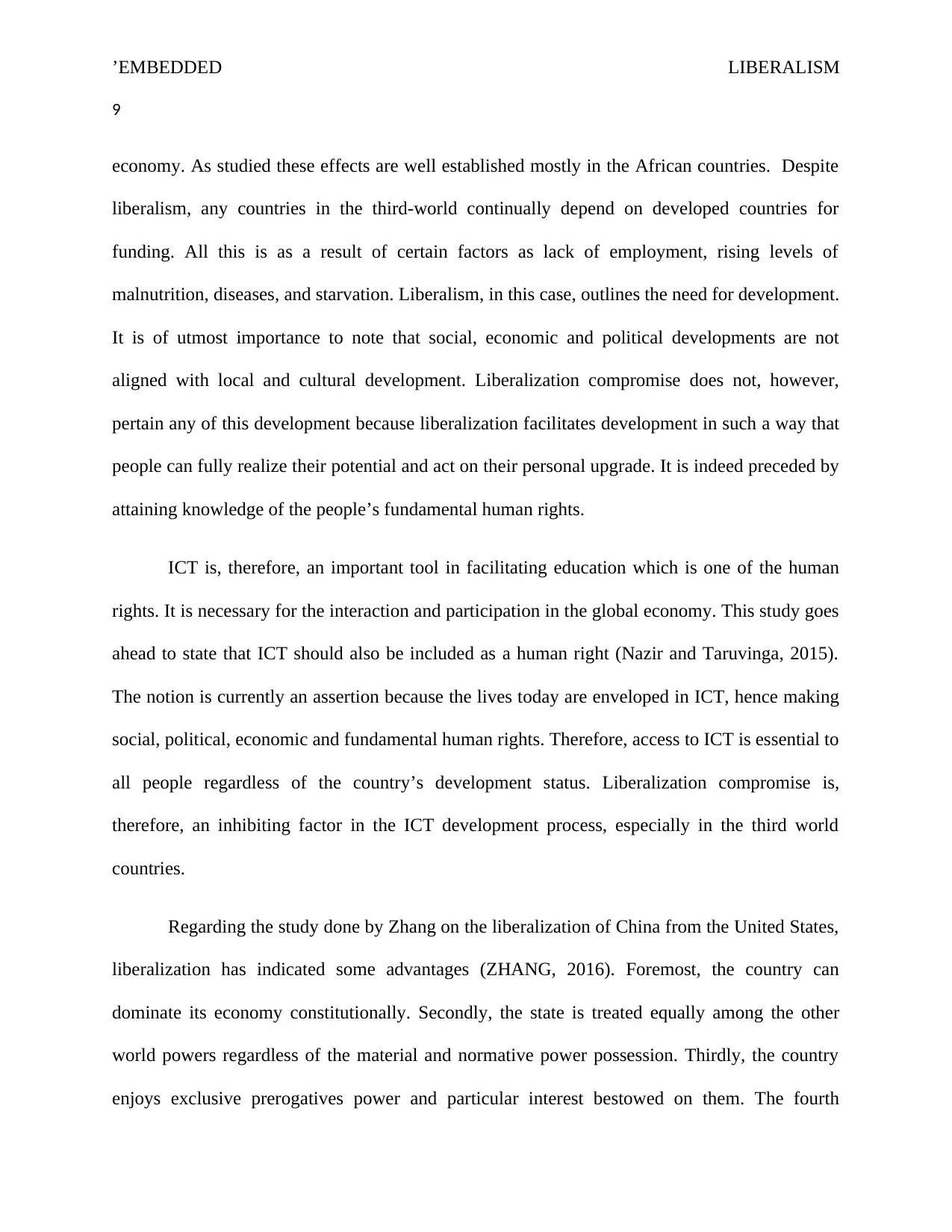
’EMBEDDED LIBERALISM
9
economy. As studied these effects are well established mostly in the African countries. Despite
liberalism, any countries in the third-world continually depend on developed countries for
funding. All this is as a result of certain factors as lack of employment, rising levels of
malnutrition, diseases, and starvation. Liberalism, in this case, outlines the need for development.
It is of utmost importance to note that social, economic and political developments are not
aligned with local and cultural development. Liberalization compromise does not, however,
pertain any of this development because liberalization facilitates development in such a way that
people can fully realize their potential and act on their personal upgrade. It is indeed preceded by
attaining knowledge of the people’s fundamental human rights.
ICT is, therefore, an important tool in facilitating education which is one of the human
rights. It is necessary for the interaction and participation in the global economy. This study goes
ahead to state that ICT should also be included as a human right (Nazir and Taruvinga, 2015).
The notion is currently an assertion because the lives today are enveloped in ICT, hence making
social, political, economic and fundamental human rights. Therefore, access to ICT is essential to
all people regardless of the country’s development status. Liberalization compromise is,
therefore, an inhibiting factor in the ICT development process, especially in the third world
countries.
Regarding the study done by Zhang on the liberalization of China from the United States,
liberalization has indicated some advantages (ZHANG, 2016). Foremost, the country can
dominate its economy constitutionally. Secondly, the state is treated equally among the other
world powers regardless of the material and normative power possession. Thirdly, the country
enjoys exclusive prerogatives power and particular interest bestowed on them. The fourth
9
economy. As studied these effects are well established mostly in the African countries. Despite
liberalism, any countries in the third-world continually depend on developed countries for
funding. All this is as a result of certain factors as lack of employment, rising levels of
malnutrition, diseases, and starvation. Liberalism, in this case, outlines the need for development.
It is of utmost importance to note that social, economic and political developments are not
aligned with local and cultural development. Liberalization compromise does not, however,
pertain any of this development because liberalization facilitates development in such a way that
people can fully realize their potential and act on their personal upgrade. It is indeed preceded by
attaining knowledge of the people’s fundamental human rights.
ICT is, therefore, an important tool in facilitating education which is one of the human
rights. It is necessary for the interaction and participation in the global economy. This study goes
ahead to state that ICT should also be included as a human right (Nazir and Taruvinga, 2015).
The notion is currently an assertion because the lives today are enveloped in ICT, hence making
social, political, economic and fundamental human rights. Therefore, access to ICT is essential to
all people regardless of the country’s development status. Liberalization compromise is,
therefore, an inhibiting factor in the ICT development process, especially in the third world
countries.
Regarding the study done by Zhang on the liberalization of China from the United States,
liberalization has indicated some advantages (ZHANG, 2016). Foremost, the country can
dominate its economy constitutionally. Secondly, the state is treated equally among the other
world powers regardless of the material and normative power possession. Thirdly, the country
enjoys exclusive prerogatives power and particular interest bestowed on them. The fourth
⊘ This is a preview!⊘
Do you want full access?
Subscribe today to unlock all pages.

Trusted by 1+ million students worldwide
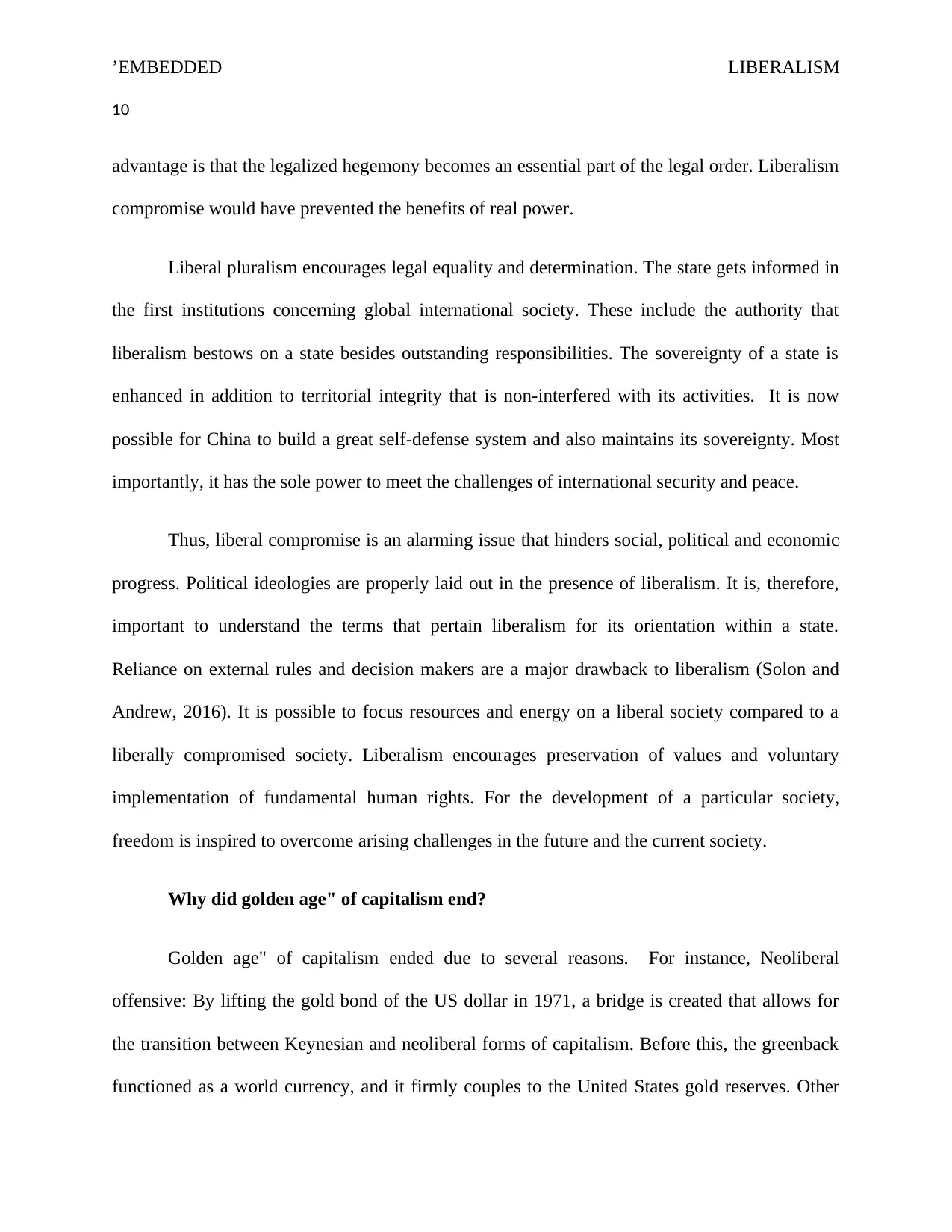
’EMBEDDED LIBERALISM
10
advantage is that the legalized hegemony becomes an essential part of the legal order. Liberalism
compromise would have prevented the benefits of real power.
Liberal pluralism encourages legal equality and determination. The state gets informed in
the first institutions concerning global international society. These include the authority that
liberalism bestows on a state besides outstanding responsibilities. The sovereignty of a state is
enhanced in addition to territorial integrity that is non-interfered with its activities. It is now
possible for China to build a great self-defense system and also maintains its sovereignty. Most
importantly, it has the sole power to meet the challenges of international security and peace.
Thus, liberal compromise is an alarming issue that hinders social, political and economic
progress. Political ideologies are properly laid out in the presence of liberalism. It is, therefore,
important to understand the terms that pertain liberalism for its orientation within a state.
Reliance on external rules and decision makers are a major drawback to liberalism (Solon and
Andrew, 2016). It is possible to focus resources and energy on a liberal society compared to a
liberally compromised society. Liberalism encourages preservation of values and voluntary
implementation of fundamental human rights. For the development of a particular society,
freedom is inspired to overcome arising challenges in the future and the current society.
Why did golden age" of capitalism end?
Golden age" of capitalism ended due to several reasons. For instance, Neoliberal
offensive: By lifting the gold bond of the US dollar in 1971, a bridge is created that allows for
the transition between Keynesian and neoliberal forms of capitalism. Before this, the greenback
functioned as a world currency, and it firmly couples to the United States gold reserves. Other
10
advantage is that the legalized hegemony becomes an essential part of the legal order. Liberalism
compromise would have prevented the benefits of real power.
Liberal pluralism encourages legal equality and determination. The state gets informed in
the first institutions concerning global international society. These include the authority that
liberalism bestows on a state besides outstanding responsibilities. The sovereignty of a state is
enhanced in addition to territorial integrity that is non-interfered with its activities. It is now
possible for China to build a great self-defense system and also maintains its sovereignty. Most
importantly, it has the sole power to meet the challenges of international security and peace.
Thus, liberal compromise is an alarming issue that hinders social, political and economic
progress. Political ideologies are properly laid out in the presence of liberalism. It is, therefore,
important to understand the terms that pertain liberalism for its orientation within a state.
Reliance on external rules and decision makers are a major drawback to liberalism (Solon and
Andrew, 2016). It is possible to focus resources and energy on a liberal society compared to a
liberally compromised society. Liberalism encourages preservation of values and voluntary
implementation of fundamental human rights. For the development of a particular society,
freedom is inspired to overcome arising challenges in the future and the current society.
Why did golden age" of capitalism end?
Golden age" of capitalism ended due to several reasons. For instance, Neoliberal
offensive: By lifting the gold bond of the US dollar in 1971, a bridge is created that allows for
the transition between Keynesian and neoliberal forms of capitalism. Before this, the greenback
functioned as a world currency, and it firmly couples to the United States gold reserves. Other
Paraphrase This Document
Need a fresh take? Get an instant paraphrase of this document with our AI Paraphraser
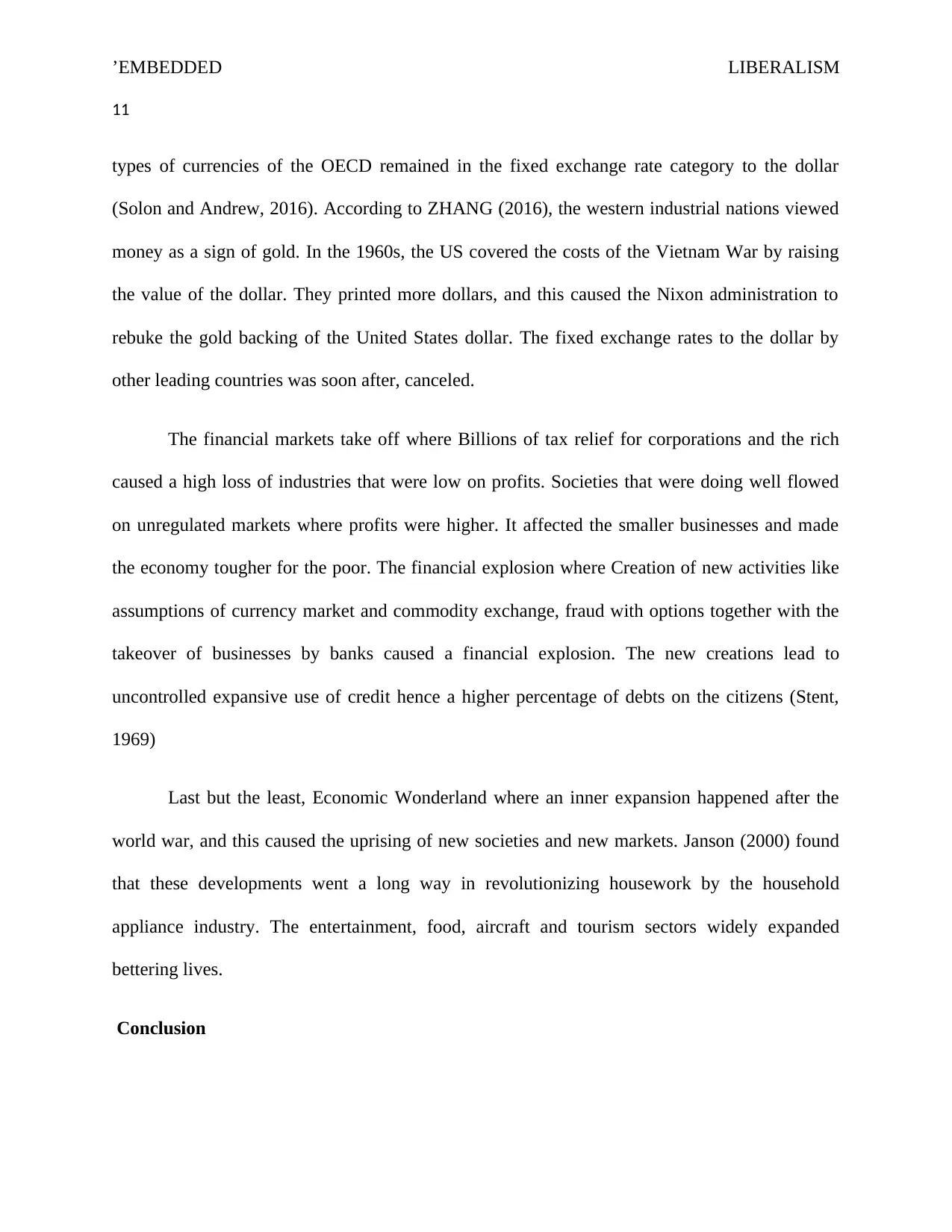
’EMBEDDED LIBERALISM
11
types of currencies of the OECD remained in the fixed exchange rate category to the dollar
(Solon and Andrew, 2016). According to ZHANG (2016), the western industrial nations viewed
money as a sign of gold. In the 1960s, the US covered the costs of the Vietnam War by raising
the value of the dollar. They printed more dollars, and this caused the Nixon administration to
rebuke the gold backing of the United States dollar. The fixed exchange rates to the dollar by
other leading countries was soon after, canceled.
The financial markets take off where Billions of tax relief for corporations and the rich
caused a high loss of industries that were low on profits. Societies that were doing well flowed
on unregulated markets where profits were higher. It affected the smaller businesses and made
the economy tougher for the poor. The financial explosion where Creation of new activities like
assumptions of currency market and commodity exchange, fraud with options together with the
takeover of businesses by banks caused a financial explosion. The new creations lead to
uncontrolled expansive use of credit hence a higher percentage of debts on the citizens (Stent,
1969)
Last but the least, Economic Wonderland where an inner expansion happened after the
world war, and this caused the uprising of new societies and new markets. Janson (2000) found
that these developments went a long way in revolutionizing housework by the household
appliance industry. The entertainment, food, aircraft and tourism sectors widely expanded
bettering lives.
Conclusion
11
types of currencies of the OECD remained in the fixed exchange rate category to the dollar
(Solon and Andrew, 2016). According to ZHANG (2016), the western industrial nations viewed
money as a sign of gold. In the 1960s, the US covered the costs of the Vietnam War by raising
the value of the dollar. They printed more dollars, and this caused the Nixon administration to
rebuke the gold backing of the United States dollar. The fixed exchange rates to the dollar by
other leading countries was soon after, canceled.
The financial markets take off where Billions of tax relief for corporations and the rich
caused a high loss of industries that were low on profits. Societies that were doing well flowed
on unregulated markets where profits were higher. It affected the smaller businesses and made
the economy tougher for the poor. The financial explosion where Creation of new activities like
assumptions of currency market and commodity exchange, fraud with options together with the
takeover of businesses by banks caused a financial explosion. The new creations lead to
uncontrolled expansive use of credit hence a higher percentage of debts on the citizens (Stent,
1969)
Last but the least, Economic Wonderland where an inner expansion happened after the
world war, and this caused the uprising of new societies and new markets. Janson (2000) found
that these developments went a long way in revolutionizing housework by the household
appliance industry. The entertainment, food, aircraft and tourism sectors widely expanded
bettering lives.
Conclusion
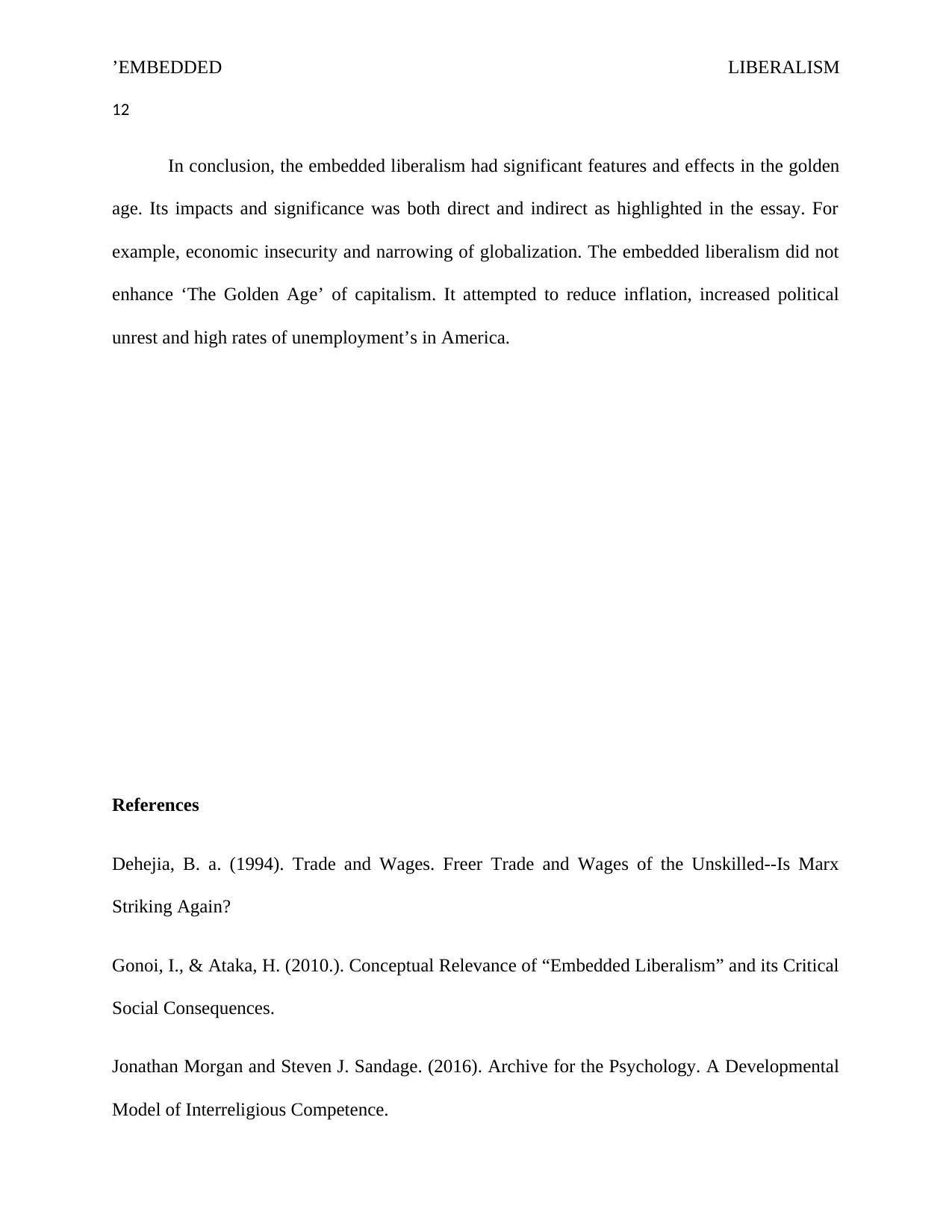
’EMBEDDED LIBERALISM
12
In conclusion, the embedded liberalism had significant features and effects in the golden
age. Its impacts and significance was both direct and indirect as highlighted in the essay. For
example, economic insecurity and narrowing of globalization. The embedded liberalism did not
enhance ‘The Golden Age’ of capitalism. It attempted to reduce inflation, increased political
unrest and high rates of unemployment’s in America.
References
Dehejia, B. a. (1994). Trade and Wages. Freer Trade and Wages of the Unskilled--Is Marx
Striking Again?
Gonoi, I., & Ataka, H. (2010.). Conceptual Relevance of “Embedded Liberalism” and its Critical
Social Consequences.
Jonathan Morgan and Steven J. Sandage. (2016). Archive for the Psychology. A Developmental
Model of Interreligious Competence.
12
In conclusion, the embedded liberalism had significant features and effects in the golden
age. Its impacts and significance was both direct and indirect as highlighted in the essay. For
example, economic insecurity and narrowing of globalization. The embedded liberalism did not
enhance ‘The Golden Age’ of capitalism. It attempted to reduce inflation, increased political
unrest and high rates of unemployment’s in America.
References
Dehejia, B. a. (1994). Trade and Wages. Freer Trade and Wages of the Unskilled--Is Marx
Striking Again?
Gonoi, I., & Ataka, H. (2010.). Conceptual Relevance of “Embedded Liberalism” and its Critical
Social Consequences.
Jonathan Morgan and Steven J. Sandage. (2016). Archive for the Psychology. A Developmental
Model of Interreligious Competence.
⊘ This is a preview!⊘
Do you want full access?
Subscribe today to unlock all pages.

Trusted by 1+ million students worldwide
1 out of 13
Your All-in-One AI-Powered Toolkit for Academic Success.
+13062052269
info@desklib.com
Available 24*7 on WhatsApp / Email
![[object Object]](/_next/static/media/star-bottom.7253800d.svg)
Unlock your academic potential
Copyright © 2020–2026 A2Z Services. All Rights Reserved. Developed and managed by ZUCOL.